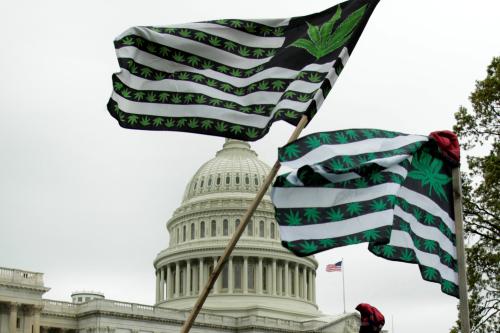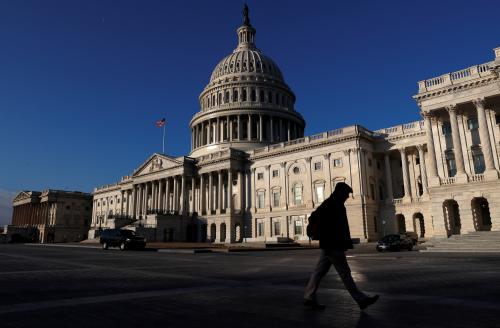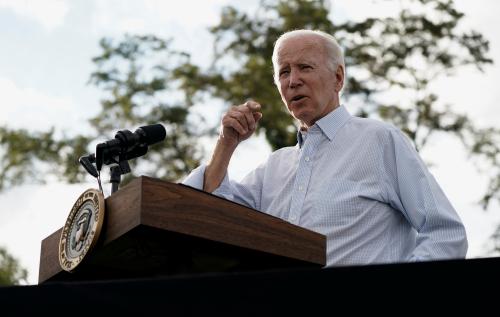It is no secret that the Democratic Party priority for cannabis policy reform is not a priority in the Biden White House. Throughout the 2020 Democratic primary, Joe Biden was the most moderate candidate on this issue. And although his position on cannabis evolved relative to his views as a senator in the 1980s and 1990s, he still remained to the right of most elected Democrats and Democratic voters on cannabis.
Biden is not the only person who is out of step with his party on cannabis reform. Understanding why is important to those who hope to chart a path forward.
It is not terribly surprising that someone with Mr. Biden’s background would oppose cannabis.
As a member of the Silent Generation (Americans born between 1925 and 1944), Mr. Biden belongs to an age cohort that is the most opposed to cannabis reform in the American electorate. According to an April 2021 Pew poll, only 32% of Americans 75 and older supported adult-use cannabis reform. A majority of every other age cohort under 75 support legalization. And while there have been some increases in the Silent Generation’s support for legalization over the past 30 years, it remains the least supportive major demographic group.
At the same time, when you dive into the reasons why opponents of cannabis reform hold that position, those answers are illustrative too. According to a 2015 Pew poll, 73% of legalization opponents say that it “hurts society, [is] bad for individuals” or is a “dangerous, addictive drug.” Those views in particular can resonate with individuals who have experienced a substance use disorder or who have had family members who have had one. That is not to say people with substance abuse disorders or their relatives will inherently oppose legalization, but for some it may provide a lens through which some people consider the issue. And Mr. Biden’s son Hunter’s public struggle with the abuse of different substances is the precise type of experience that leads some people to oppose drug reform.
At the same time, we know that some segment of the population has and will change their mind on cannabis reform. The key to that change—like on any policy issue—involves framing the issue in a specific, appealing way that connects with a person or a set of people. One manner in which legalization advocates have been successful in framing the argument involves science. Research has effectively demonstrated the faultiness of the so-called ‘gateway effect’ theory that claims cannabis use drives individuals to using harder drugs. At the same time, research into the relationship between cannabis legalization and substance use disorders is mixed at best. And while some research does demonstrate increases in cannabis use disorders or other disorders coinciding with legalization, cannabis reform advocates point to the ability to tax legal cannabis and use portions of that revenue for enhanced mental health and addiction services.
Beyond the science around substance use disorders, another set of arguments from cannabis reform advocates have gained steam in this debate. These center on the harmful effects of criminalization and the racial inequities in cannabis law enforcement. By highlighting how the criminal justice system does little to help individuals battling substance use disorders—and in some situations makes those battles more complicated—advocates have convinced a subset of Americans that we can design a policy more effective than drug prohibition.
Mr. Biden has already suggested that he sees the cannabis issue differently than he did during his tenure as a senator. During the primary campaign he signaled an understanding of the racial dynamics around drug enforcement, arguing that people should not be spending time in jail for low-level cannabis offenses. During the general election campaign, a significant part of Mr. Biden’s rhetoric centered on issues of racial and criminal justice. Racial and criminal justice issues inherently include issues of cannabis policy given the demonstrated racial biases in cannabis enforcement and adjudication.
However, something is happening in the White House that also happens in the mass public. While the president supports some type of changes to cannabis policy, the issue apparently lacks the salience to prioritize the issue thus far in his tenure. This mirrors complaints some in the cannabis community have about why greater progress has not been made on the issue given the broad support in the public (nearly 70% in some polling). Many Americans do not see this issue as a priority or hold a position with such deep passion that it moves a significant number of U.S. senators to make change happen. For advocates to succeed at any level—among voters and among elected officials all the way up to the president—they must convince them of the importance of the issue.
One way to convince the president of the salience of this issue is to connect it to specific issues the president cares about. Demonstrating the opportunities that cannabis legalization can create to fund mental health and addiction services is helpful for anyone with a child who experienced a substance use disorder. Amplifying the importance of cannabis reform for communities of color and issues of justice and opportunity is particularly powerful to a president whose election hinged on support and turnout from communities of color.
A Biden embrace of cannabis reform could also put him in the driver’s seat to shape the law more closely to his liking. If Mr. Biden believes others in the party may prefer an overly permissive system of regulation, he could use his position to rein that in. As president, particularly if cannabis reform was achieved via executive branch processes, he could play a powerful hand in setting the precise role of the federal government in this space. At the same time, as a reflection of his own views and as meaningful outreach to the demographic groups who lifted him to office, he can push his administration to use cannabis reform to address a variety of issues of racial justice. That latter effort will also serve as an olive branch to a group of progressive legislators, interest groups, and voters who may grow skeptical of the president’s willingness or ability to advance their interests.
Ultimately, it is not surprising that a 78-year old president with a family history of substance abuse and a political history of supporting drug criminalization would oppose cannabis reform. However, the current political and policy environments position Mr. Biden to buck his age, his history, and expectations about his presidency to craft cannabis reform that helps reverse decades of injustice and enhances his standing with the precise electoral groups he needs to be a successful president.







Commentary
Why has President Biden been slow to embrace cannabis reform?
May 24, 2021